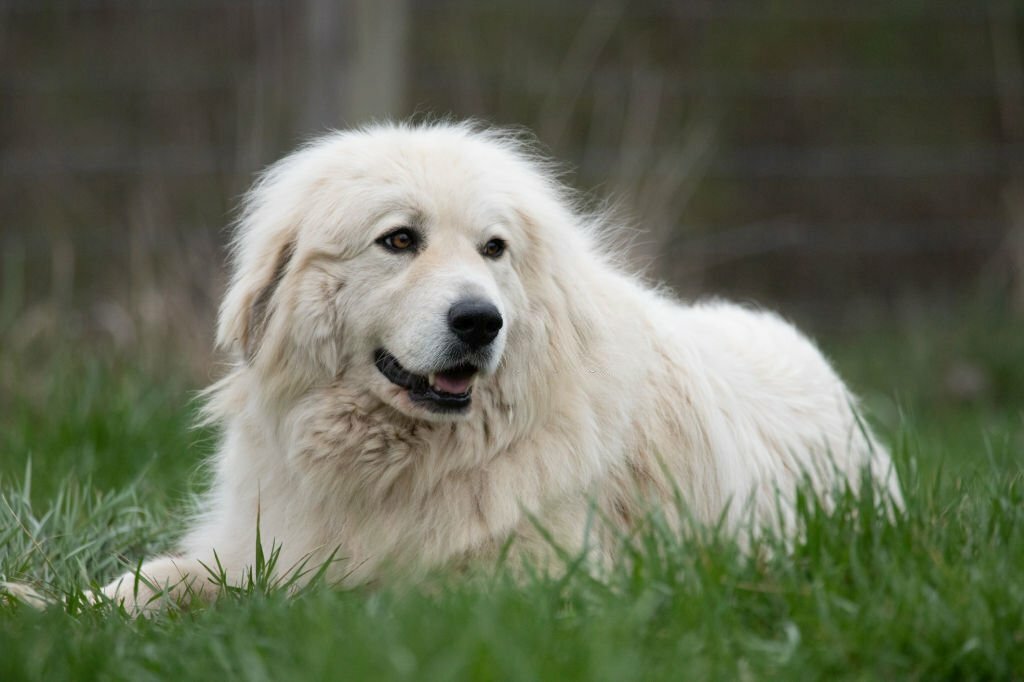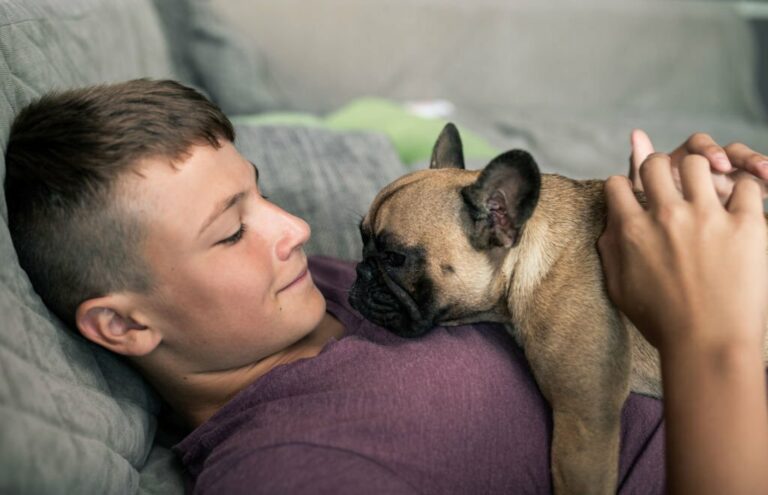Emotional support animals (ESAs) can be invaluable allies for those suffering from mental health conditions. Helping their owners navigate social situations and providing comfort during stressful circumstances.
Every pet can serve as an emotional support animal (ESA), though certain breeds are better equipped than others for this role. Relaxed, friendly dogs that naturally gravitate toward their owners make ideal ESAs.
1. Great Pyrenees

Pyrs, also renowned as giant breed dogs, are gentle giants known to offer comfort during nightly walks, provide warmth on cold winter days, and remain loyal friends throughout their lifetimes.
Training should begin early for these dogs and they respond best to gentle, positive reinforcement. Their memory is formidable and learning comes quickly; yet, they remain strong-willed creatures.
Pyrenees make great apartment pets, yet prefer homes with larger yards. Their low energy needs require only moderate exercise such as an occasional long daily walk. Due to bloat risk (when their stomach twists and cuts off blood supply to their organs) this breed may also be at an increased risk of elbow and hip dysplasia. Therefore, reputable breeders should screen for such conditions before breeding their puppies.
2. Maltese
Pet owners know the unwavering love and joy their furry companions provide them. Even legendary psychoanalyst Sigmund Freud used his dog Jofi during therapy sessions with some of his patients, providing another source of emotional stability. Making pets an effective emotional support solution for people dealing with depression.
These silky white, pint-size cuddle bugs are playful, affectionate. And intelligent companions who are highly trainable and adapt easily to different environments. Additionally, they make excellent medical alert dogs by recognizing symptoms like low blood sugar, epilepsy, and low oxygen levels.
This breed of dog is naturally affectionate and will always remain by your side. They’re attentive and able to communicate how they are feeling with you, providing both understanding and comfort when needed. These companions make ideal companions for single adults since they typically bond strongly with a specific individual.
3. Shih Tzu

Emotional support animals come in all shapes and sizes; any breed or size can provide a comforting presence and help relieve anxiety or depression symptoms. An ESA must be legally prescribed by a certified psychiatrist or psychologist who verifies that you have a mental health disability that the animal alleviates.
Shih Tzus are small dogs that make for ideal cuddling companions, as their fur is soft enough for cuddling and snuggling. Plus, this breed loves attention so much it will do anything it can to win you praise – making them especially helpful companions for people suffering from depression who need an extra bit of affection to feel better.
Although this breed of dog is generally very healthy. It is still wise to have them checked regularly for common conditions like kneecap dislocation and periodontal disease. Which may arise as their small mouths overcrowd with tartar and plaque buildup. Regular vet checkups and brushing can ensure their teeth remain in top shape.
4. Shih Tzu mix
Emotional support dogs (ESDs) help their owners cope with mental disabilities such as posttraumatic stress disorder (PTSD), anxiety disorders, and even aerophobia (fear of flying). ESDs offer comfort in multiple forms.
Shih Tzus are great emotional support animals. These small dogs will do anything they can to make their owner happy, as well as loving attention. Furthermore, these calm creatures make great therapy dogs for kids!
These small pets require minimal exercise, making them suitable for people with limited mobility and living in apartments with breed or weight restrictions. ESAS must be registered as emotional support animals to avoid discrimination; failing to register them as such is illegal. Including falsely claiming one as such to bypass paying deposits or moving into buildings that prohibit pets.
5. Miniature Pinscher
Fans fondly refer to this breed of toy dog as the King of Toys; these small canines with impressive personalities are truly one-of-a-kind pets. Boasting compact wedge-shaped bodies and coats in red, chocolate, and rust colors (or black with rust markings). Or black with rust markings – they make excellent family companions.
These dogs have an exceptionally calm nature and easygoing demeanor, making them the ideal companions for people experiencing anxiety or panic attacks involving physical symptoms like rapid heartbeat or sweating.
On top of all that, these dogs make ideal socialization tools because they’re affectionate creatures who love being petted by strangers in public spaces. Furthermore, their compact nature makes them great travel companions – perfect for emotional support animal owners with frequent trips to doctors or public locations. In particular, they may help people who suffer from Post-Traumatic Stress Disorder (PTSD).
6. Miniature Schnauzer
Beagle terriers (German for “beard”) are filled with personality. They make excellent family companions and are very alert. Due to their native intelligence and rapid learning capability, these little dogs can be trained quickly for obedience or agility competitions or earth dog trials.
This energetic small dog is the ultimate people person. His friendly disposition and humor–with its bushy eyebrows and walrus mustache–are sure to brighten any day!
Miniature Schnauzers can suffer from the portosystemic shunt, so their weight must be managed carefully to prevent liver problems such as a portosystemic shunt. They tend to hoard calories like Beanie Babies so it is essential that they get regular physical activity and you monitor their intake. While exercising frequently for optimal weight management. Socialization and training early are necessary for Miniature Schnauzers to become well-mannered pets.
7. Miniature Dachshund
Miniature dachshunds are fun companions who can help ease socially awkward situations or provide comfort at home. Their petite size also makes them suitable for apartment living. Although sweet and affectionate, doxies also possess protective instincts; when strangers approach, they’ll bark to deter potential threats by barking.
Emotional support dogs don’t require extensive training to provide emotional support; rather, they should exhibit calming qualities and be attuned to their human emotions to assist. While all sizes or breeds of dogs may provide this service, those with calm personalities tend to do best. Long walks, exercise sessions, and travel should also go smoothly; Dachshunds in particular tend to suffer from intervertebral disk disease (IVDD), so daily walks and other forms of physical exercise should also help protect their spine from developing this condition – which makes daily walks essential – while intervertebral disk disease (IVDD). Therefore, these animals must receive emotional support.
8. Miniature Poodle
Poodles’ frilly coat belies an athletic and intelligent athlete. Highly social, poodles form close bonds with their humans and have the unique ability to sense changes in mood by picking up on cues from them.
As puppies are extremely obedient animals, making them perfect companions for people with mobility issues or other disabilities. Furthermore, their excellent temperament allows them to easily adapt to many environments – even pet-restricted buildings!
Corgis are sure to put a smile on your face with their short legs, rotund hind ends, and bushy tails! Their happy personalities and easygoing nature make them great companions for those struggling with anxiety or depression. However, due to their brachycephalic features, they may require special accommodations during flights; nevertheless, they make great lap warmers that love getting soft scratches behind their ears!
9. Miniature Bulldog
Miniature Bulldogs make excellent companion animals for those living with anxiety disorders. These intelligent, sensitive canines are easy to train, friendly, and get along well with other animals and children of all ages – in fact, they travel well too despite potentially being wary around strangers.
An emotional support dog can provide individuals with posttraumatic stress disorder (PTSD) relief by providing physical comfort, giving their owners purpose, and connecting them with other people; all of which help alleviate feelings of isolation and depression.
To qualify for an emotional support animal, one must possess both a valid medical diagnosis and a letter from a mental health provider – this could include a therapist, psychiatrist, or psychologist – but not all dogs qualify as emotional support animals.
10. Miniature Chihuahua
Chihuahuas are small and easily portable dogs, making them great travel companions. These lively floors love cuddling up on someone’s lap or riding in their tote bags when running errands or shopping; however, they tend to form deep bonds with only one or two individuals within their immediate family unit and ignore strangers outside of this.
Owners can legally qualify their pets as emotional support animals by receiving a letter from a mental health professional stating their condition and how the pet helps alleviate symptoms. Emotional support dogs don’t require special training; instead, they must be housebroken, well-behaved in public, and under control at all times – often their current dog makes the perfect emotional support animal as the two already share an affinity and understand each other’s needs.
11. Chickens
Chickens might not be the first animals that come to mind as emotional support animals, but they make wonderful companions. Domesticated birds such as chickens are popularly kept as pets or kept for their eggs and meat production, yet can also provide psychological support in times of depression. Famously known for their distinctive crows made by male birds known as roosters; living hierarchically within groups as dedicated mothers without producing milk like mammals can also provide helpful companionship.
Animals such as chickens are omnivores, feeding on seeds, grass, insects, worms, and small reptiles. With clawed feet used for scratching up food from the ground and fleshy folds on their heads known as wattles or combs for male chickens (known as cocks or roosters), male chickens possessing these characteristics are called “roosters”.
Animals belonging to the Galliformes order survived an asteroid strike 66 million years ago that extinct non-avian dinosaurs. Galliformes animals can be taught tricks and are highly social animals.
12. Llamas and Alpacas
Llamas and alpacas may appear similar at first glance–both have long ears, perma-smiles, and long, leggy extremities. Both species make excellent companion animals and each has unique personalities which help owners feel at ease.
Pets have many advantages, from increasing positive emotions and heart health improvements to alleviating depression symptoms. And being easy to care for – making them the ideal companions for people living alone.
However, they often get a bad rap due to their tendency to hiss or spit if mistreated. Llamas tend to prefer being left alone while alpacas prefer traveling in groups. Both species grow finer fleece than their respective llama counterparts and both possess two-toed feet instead of the traditional split hooves found on other ungulates; both animals serve well as guard animals against predators as well as carrying large loads for extended distances. While being trained specifically to perform tasks that llamas lack.
13. Rabbits
Domesticated rabbits (Oryctolagus cuniculus) are highly intelligent animals. Not only are they extremely social creatures, but their intelligence extends even to recognizing their owners by sight and reading their emotions according to research.
As with other prey animals, rabbits are wary of loud noises. And sudden movements, so handling them carefully is vital to their well-being. Furthermore, rabbits tend to hide symptoms of illness so it’s wise to visit the veterinarian as soon as you notice anything unusual about your rabbit’s health.
Rabbits make excellent emotional support animals. Many farms and sanctuaries offer emotional support to rabbits as emotional companions for people experiencing stress. As they’re used to being handled by humans with soft fur that’s delightful to touch. Local laws must be abided by when considering this animal for emotional support use.
14. Horses
Horses have played a pivotal role in human history for millennia. Domestic and wild horses alike have served man in plowing fields, hauling cargo, carrying soldiers into battle, transporting adventurers into new lands. And providing recreation through jousts tournaments carousels horseback riding; providing inspiration to artists from Stone Age drawings to Parthenon frieze carvings. Tang dynasty tomb sculptures to Leonardo da Vinci sketches and Andrea del Verrocchio Colleoni drawings and beyond.
Horses, like other true grazing herbivores, possess unique adaptations for plant-eating that include high-crowned teeth that grind grass and other tough vegetation. As well as an extended digestive tract dominated by their large intestine which digests cellulose material. The horses are social animals and typically live in herds.
Horses are gentle creatures who enjoy being petted, brushed, and ridden, making them great emotional support options. Training requirements for these horses are minimal; therefore, many therapy farms are available that visit hospitals, schools, and nursing homes.
15. Birds of Prey
Birds of prey are among the top predators of the skies, possessing razor-sharp talons and wings big enough to cover an adult human being. Not only can these magnificent birds protect us from threats in the sky, but they’re also amazing support animals for those suffering from anxiety or panic attacks; and can even help people sleep better!
All it takes to obtain an emotional support animal designation is a letter from a licensed therapist or medical health professional stating the animal can provide therapeutic benefits. Once approved, follow emotional support animal laws which permit living or traveling with the pet in certain ways.

